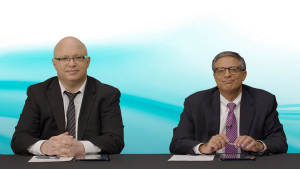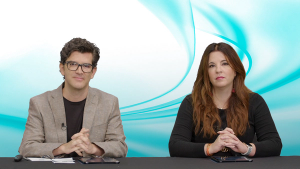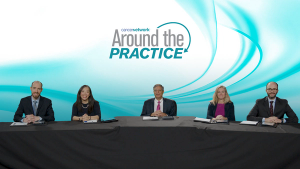Articles by Sagar Lonial, MD, FACP
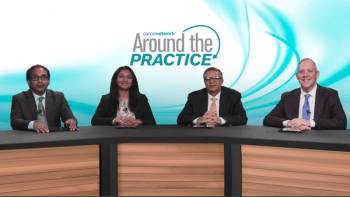
Panelists discuss a clinical scenario involving a 56-year-old male man with myeloma and del 17p deletion, treated with RVD induction, auto transplant, and lenalidomide maintenance, who relapsed after 2 years and is now referred to discuss chimeric antigen receptor (CAR) CAR-T versus vs standard therapy, sharing key takeaways and pearls from the case.

Panelists discuss successful collaborations between academic centers and community practices in the context of (chimeric antigen receptor (CAR) T-cell therapy for multiple myeloma, key lessons learned in integrating CAR T therapy into the treatment landscape, and future plans for expanding CAR T therapy’s role in earlier lines of multiple myeloma treatment.

Panelists discuss their institution’s approach to co-management and co-monitoring of (chimeric antigen receptor (CAR) -T patients, strategies to facilitate seamless transitions of care between academic centers and community practices, common challenges in the CAR -T referral process and solutions, and advice for community physicians on the timing and preparation for patient referrals.

Panelists explain how CAR-T cell therapy works and describe the treatment process, discussing whether CAR -T is considered a complex procedure at their institution or if the logistics have been streamlined into clinical workflows, and they also detail their institution's approach to bridging therapy for patients awaiting CAR-T manufacturing and infusion, including whether patients are managed in-house or sent back to community centers.

Panelists discuss which patients are considered for CAR-T therapy in second-line treatment for relapsed/refractory multiple myeloma (R/R MM) (cilta-cel vs ide-cel), describe the specific criteria and institutional guidelines used to determine patient eligibility, and explore how non-medical factors like such as location and financial considerations impact patient selection, while also outlining the typical CAR-T referral process from community physician outreach to patient evaluation and selection.

Panelists discuss the key factors that influence their institution's decision to utilize CAR-T therapy in earlier lines of treatment for relapsed/refractory multiple myeloma and explain the next steps they would take if choosing CAR-T, including the rationale behind their decisions.

Panelists discuss the data surrounding the use of CAR-T therapy in earlier lines of treatment for relapsed/refractory multiple myeloma (R/R MM), including findings from the cilta-cel (Popat R, et al. ASH 2024 No. 1032; Mateos MV, et al. IMS 2024 No. OA-65), and Idel-cel (Ailawadhi S, et al. Blood 2024) studies, and share their thoughts on the implications of these results.
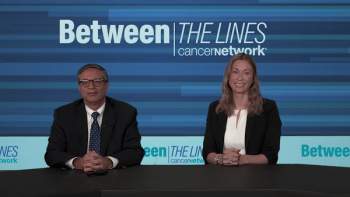
Sagar Lonial, MD, and Ellen Marin, PA-C, discuss the impact and key takeaways from their study as well as study limitations and future directions.

Ellen Marin, PA-C, presents the study conclusions and discusses its implications on managing CRS associated with teclistamab with Dr. Lonial.

Study results show that prophylactic tocilizumab reduces CRS incidence and severity in patients receiving teclistamab.

An overview of teclistamab in RRMM and the study methodology of using prophylactic tocilizumab to mitigate CRS associated with teclistamab

Sagar Lonial, MD, and Ellen Marin, PA-C, discuss cytokine release syndrome (CRS) and the strategy to manage CRS in their clinic.

Sagar Lonial, MD, provides an overview of the currently available treatment options in relapsed/refractory multiple myeloma.
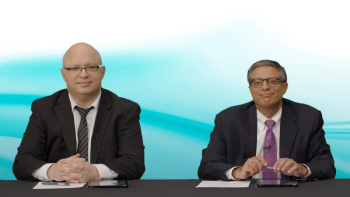
Advancements in Multiple Myeloma IO Therapy: Key Takeaways
BySagar Lonial, MD, FACP,Luciano Costa, MD, PhD,Cesar Rodriguez, MD,Donna Catamero, ANP-BC, OCN, CCRC Leading experts discuss the evolving landscape of myeloma immunotherapy, highlighting the potential of CAR-T and bispecifics and emphasizing the need for effective management of related toxicities to enhance patient outcomes.
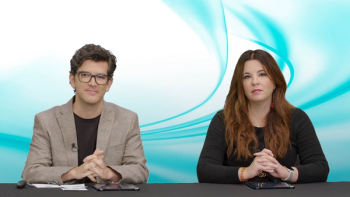
Navigating CAR-T Therapy in RRMM: Patient Counsel and Managing AEs
BySagar Lonial, MD, FACP,Luciano Costa, MD, PhD,Cesar Rodriguez, MD,Donna Catamero, ANP-BC, OCN, CCRC Explore the critical aspects of counseling patients on the expectations and management of cytokine release syndrome (CRS) and immune effector cell-associated neurotoxicity syndrome (ICANS) associated with CAR-T therapy.
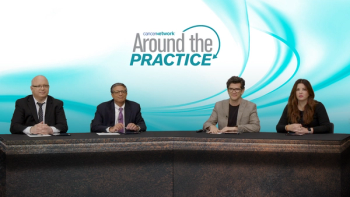
CAR-T vs BCMA Bispecifics: Navigating Myeloma Treatment Decisions
BySagar Lonial, MD, FACP,Luciano Costa, MD, PhD,Cesar Rodriguez, MD,Donna Catamero, ANP-BC, OCN, CCRC Expert panelists review the complex decision-making process between CAR-T and BCMA bispecific therapies in the management of relapsed myeloma, discussing patient-specific factors and relative risks and benefits.

Patient Scenario: Navigating Sequencing in Multiple Myeloma
BySagar Lonial, MD, FACP,Luciano Costa, MD, PhD,Cesar Rodriguez, MD,Donna Catamero, ANP-BC, OCN, CCRC A complex case study in multiple myeloma management, exploring treatment sequencing options for a patient with a long history of disease and multiple lines of therapy.

Multiple Myeloma: Optimizing ICANS and CRS Management
BySagar Lonial, MD, FACP,Luciano Costa, MD, PhD,Cesar Rodriguez, MD,Donna Catamero, ANP-BC, OCN, CCRC Gain insight into strategies for monitoring for ICANS and CRS in myeloma treatment, including inpatient and outpatient administration, tocilizumab, dexamethasone, and impact on patient care.

Managing AEs in Multiple Myeloma: Dosing and Prophylactic Strategies
BySagar Lonial, MD, FACP,Luciano Costa, MD, PhD,Cesar Rodriguez, MD,Donna Catamero, ANP-BC, OCN, CCRC Key opinion leaders share their insight on managing adverse events in myeloma treatment, including dose adjustments and prophylactic strategies to improve outcomes and patient quality of life.

Adverse Events With Bispecific Therapy: Dysgeusia, Skin, and Nail Changes
BySagar Lonial, MD, FACP,Luciano Costa, MD, PhD,Cesar Rodriguez, MD,Donna Catamero, ANP-BC, OCN, CCRC Overview of challenges in managing adverse events associated with bispecific therapy in multiple myeloma, including dysgeusia, skin toxicity, and nail changes patients may experience.

Bispecific Therapies in Multiple Myeloma: Impact on Real-World Practice
BySagar Lonial, MD, FACP,Luciano Costa, MD, PhD,Cesar Rodriguez, MD,Donna Catamero, ANP-BC, OCN, CCRC Experts share how the availability of three new bispecific therapies has transformed myeloma patient care, offering a lifeline to those previously without treatment options and showcasing positive responses in various patient populations.

Bispecific Therapies in RRMM: Teclistamab, Talquetamab, and Elranatamab Updates
BySagar Lonial, MD, FACP,Luciano Costa, MD, PhD,Cesar Rodriguez, MD,Donna Catamero, ANP-BC, OCN, CCRC Insight into the latest updates on three approved bispecific therapies in the context of relapsed and refractory multiple myeloma, including teclistamab, talquetamab, and elranatamab, discussing response rates, administration, and side effects.

Patient Scenario: Management of Multiple Myeloma With Talquetamab Therapy
BySagar Lonial, MD, FACP,Luciano Costa, MD, PhD,Cesar Rodriguez, MD,Donna Catamero, ANP-BC, OCN, CCRC Dive into a compelling case study showcasing the effective use of talquetamab therapy in the management of relapsed multiple myeloma, discussing responses, side effects, and treatment outcomes.

Earlier Use of Novel Therapeutics in Multiple Myeloma Treatment Pathways
BySagar Lonial, MD, FACP,Luciano Costa, MD, PhD,Cesar Rodriguez, MD,Donna Catamero, ANP-BC, OCN, CCRC Explore the potential in earlier use of novel therapy in multiple myeloma, including immunotherapy, bispecifics, and CAR-T therapies, with promising responses and potential paradigm shifts.

Evolving Treatment Paradigms in Relapsed/Refractory Multiple Myeloma
BySagar Lonial, MD, FACP,Luciano Costa, MD, PhD,Cesar Rodriguez, MD,Donna Catamero, ANP-BC, OCN, CCRC Join moderator Sagar Lonial, MD, FACP, and a panel of experts as they discuss recent updates in the management of relapsed and refractory multiple myeloma, exploring impact on clinical practice.
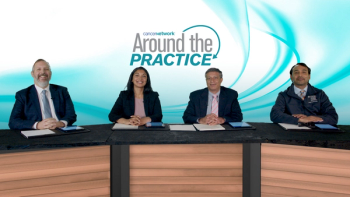
Subject matter experts share strategies for determining treatment selection and duration for patients with transplant-ineligible NDMM.

Subject matter experts share strategies for determining treatment selection and duration for patients with transplant-ineligible NDMM.

Ajay Nooka, MD, MPH, FACP leads a survey of the MAIA study, including a sub-group analysis of the MAIA study in frail patients, as well as findings from the MagnetisMM-6 study.

Jonathan Kaufman, MD describes a second patient case featuring a 76-year-old female diagnosed with transplant-ineligible NDMM.

Defining transplant eligibility, explaining the role of transplant in NDMM, and differentiating between high- and low-risk MM.








